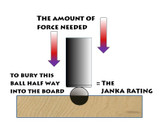3. Choosing Hardwood for Your Specific Needs

After you have determined whether either type of hardwood flooring, solid or engineered, is even a good choice for your room, and you have considered the kind(s) of installation you may encounter, your next big factor would be the hardness of the floor, how dense it is, how resistant to denting. Is this floor for Grandma’s bedroom, a playroom, or a dance floor?
Solidity, Durability, Hardness, Strength
 |
One of the most important factors to consider will be the density of the wood. The Janka Hardness Scale is the industry standard for determining this factor of a species of wood. The way it works is… well first, you have to know that a pound-force is the term for the amount of force one pound of something exerts as it rests on the gound at sea level. This test determines how many of those pounds-force it will take in order to bury a steel ball that is just under 1/2″ in diameter halfway into a piece of wood. That gives us a number, which is essentially the pounds-force, but it’s often just called the Janka number, or the Janka hardness number. |
For example, Lapacho’s number is 3864, which means that it takes 3864 pounds-force to embed that steel ball into a wood plank made of Lapacho. Despite that high number, it remains true that, to our knowledge, there is no hardwood plank in existence which can withstand that wonder of physics we call the High Heeled Shoe, but most other common household and business stresses can be handled if you pick the right species. You see, because of the structural strength properties natural to wood, most hardwood flooring really can withstand a surprising amount of abuse. Nevertheless, the hardness range is still pretty broad. Knowing Janka ratings can help you not so much with selecting a final, specific species, but you can look at a range of them, usually choosing from anything at or above your needed hardness level.
Plank Lengths and Widths
Random Lengths - click for a larger image |
Board widths can influence the direction you will choose to lay your floor. Now generally, hardwood flooring is installed perpendicular to the floor joists. Laying the hardwood planks across these, perpendicularly, provides the most stability for a floor. There are cases where a parallel installation would be okay, but those would be for circumstances so specific that this post could not advise you on that. We apologize, cut off our topknots and hang our heads in shame for coming up short here. Please, though, get expert advice on something like this, from someone who can actually see your floor in person. |
Length needs to be considered, primarily the issue of having either one standard length, such as all boards at seven feet or four feet long, or random lengths. That will affect the pattern on your floor. Also, longer lengths can be easier to install. If there are less planks to lay, there will be less steps to take in installation.

Wider boards |

Narrow Boards |
Unfinished or pre-finished hardwood?
Solid hardwood flooring is composed entirely of one wood species, usually milled from one single piece of wood, and whether full planks or strips, is the most demanding type of flooring to install. It is the only type of installation which can add sanding the floor and applying a finish into the process, though Floors To Your Home primarily (often only!) sells pre-finished flooring, so for our products you may not need those steps. With pre-finished, the coating is applied in a controlled environment where there can be no dust at all, a situation almost impossible to achieve in a home (especially when woodwork has recently been done). Early coats of finish are able to contain aluminum oxide, which strengthens the finish, and because they are set with ultraviolet rays, all of the solvents are inert even before they are packaged. This means that there are no gasses or harmful chemicals to deal with in the home. Factories finish wood at a much lower cost than do installers, and where in-home finishes often top at three coats, in a factory finishes can go up to nine coats. Still, seams between planks cannot be sealed in a factory. On the floor, this could allow spills leak through, so in some areas a top coating may still be needed. Likewise, if a pre-finished wood is subjected to a color change via sanding and refinishing, the factory finish is what will be sanded off. In any situation where you are finishing a floor, consider that sanding a whole floor can generate a considerable amount of dust. Also, any unwieldiness with a sander could leave marks or dents. If you are not confident of your abilities, we highly recommend that you go with one of our pre-finished floors.
A Random, but Very Important Tip
How much to get? Out of all of our ordering tips, this is the best one. Measure your room, multiplying the width and length to get your total square footage. It is a good rule of thumb to order about 10-15% percent extra flooring in case you wind up with any cutting mistakes, or damage a board in the installation process, or even make a slight error in your sq.ft. calculation. Also, it can be good to have replacement boards for any future repairs, as finding an accurate match years down the road might be a pain.
Next: Which Species of Hardwood Flooring is Right for You?
Related Blog Posts:
What is Handscraped Hardwood Flooring?
Laminate flooring vs. Real Hardwood
– – – –
David has written and made videos about flooring products and installation since 2011 at Floors To Your Home (.com), where he is also the PPC Manager, a Researcher, a Website & Marketing Strategy Team member, Videographer, Social Strategist, Photographer and all around Resource Jito. In my spare time I shoot and edit video, put together a podcast, explore film history, and mix music (as in ‘play with Beatles multi-tracks’). Connect with W. David Lichty
Follow Team Floors To Your Home on Facebook

 Brown Tone
Brown Tone
 Red Tone
Red Tone
 Golden Tone
Golden Tone
 Gray Tone
Gray Tone
 Light Tone
Light Tone
 Medium Tone
Medium Tone
 Dark Tone
Dark Tone
 Brown Tone
Brown Tone
 Red Tone
Red Tone
 Golden Tone
Golden Tone
 Gray Tone
Gray Tone
 Light Tone
Light Tone
 Medium Tone
Medium Tone
 Dark Tone
Dark Tone
 Multi Color
Multi Color
